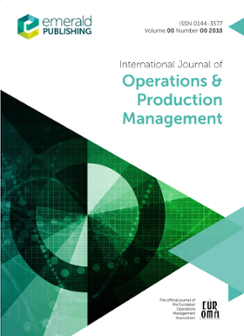员工的参与和管理者的权威对持续改进和绩效的作用
IF 7.1
2区 管理学
Q1 MANAGEMENT
International Journal of Operations & Production Management
Pub Date : 2021-05-11
DOI:10.1108/IJOPM-07-2020-0482
引用次数: 11
摘要
基于组织匹配的理论概念,本文质疑员工参与持续改进(CI)与运营绩效之间联系的相关性。长期以来,文献一直强调,CI的实施要取得成功,就需要依靠员工的参与。本文认为这种方法是不可推广的。,基于15个国家330家公司的数据库,使用回归分析假设CI和员工参与度之间的拟合与运营绩效呈正相关,CI和权力集中度之间的匹配与运营绩效负相关。作者还使用多项式回归分析和响应面方法进行了稳健性检查。,CI–员工参与度与运营绩效呈正相关,这表明当一家公司几乎没有发展出CI时,员工参与的必要性降低。随着CI的发展,员工参与度逐渐变得更加重要。此外,研究结果表明,CI-权力匹配的集中与运营绩效呈负相关,这表明当CI较低时,具有集中权力的自上而下的管理方法更可取,而当企业广泛开发CI时,自下而上的管理方法更有帮助。,本研究利用组织适合的概念来探索运营管理文献中内部实践之间的关系。作者建议,随着CI的改进,管理者应动态平衡员工参与和权力集中的做法。这项研究强调,CI具有不同的进化水平,需要不同的管理方法和实践。本文章由计算机程序翻译,如有差异,请以英文原文为准。
The role of employees' participation and managers' authority on continuous improvement and performance
Drawing on the theoretical concept of organisational fit, this paper questions the relevance of employees' participation in the link between continuous improvement (CI) and operational performance. The literature has long emphasised that to be successful, CI implementation needs to rely on employees' involvement as soon as its inception. This paper argues that this approach is not generalisable.,Based on a database of 330 firms across 15 countries, regression analyses were used to hypothesise that the fit between CI and employee participation is positively associated with operational performance, and that the fit between CI and centralisation of authority is negatively associated with operational performance. The authors also ran a robustness check with polynomial regression analyses and the response surface methodology.,CI–employee participation fit is positively associated with operational performance, suggesting that there is less need for employees to be involved when a firm has scarcely developed CI. Employee participation becomes gradually more relevant as CI progresses. Moreover, the results demonstrate that the CI–centralisation of authority fit is negatively associated with operational performance, suggesting that a top-down management approach with centralised authority is preferable when CI is low, whereas a bottom-up management approach is helpful when a firm has extensively developed CI.,This research draws on the concept of organisational fit to explore the relationships between internal practices in the operations management literature. The authors suggest that managers should dynamically balance the practices of employee participation and centralisation of authority as CI improves. This study highlights that CI has different evolutionary levels that require different managerial approaches and practices.
求助全文
通过发布文献求助,成功后即可免费获取论文全文。
去求助
来源期刊
CiteScore
13.30
自引率
17.20%
发文量
96
期刊介绍:
The mission of the International Journal of Operations & Production Management (IJOPM) is to publish cutting-edge, innovative research with the potential to significantly advance the field of Operations and Supply Chain Management, both in theory and practice. Drawing on experiences from manufacturing and service sectors, in both private and public contexts, the journal has earned widespread respect in this complex and increasingly vital area of business management.
Methodologically, IJOPM encompasses a broad spectrum of empirically-based inquiry using suitable research frameworks, as long as they offer generic insights of substantial value to operations and supply chain management. While the journal does not categorically exclude specific empirical methodologies, it does not accept purely mathematical modeling pieces. Regardless of the chosen mode of inquiry or methods employed, the key criteria are appropriateness of methodology, clarity in the study's execution, and rigor in the application of methods. It's important to note that any contribution should explicitly contribute to theory. The journal actively encourages the use of mixed methods where appropriate and valuable for generating research insights.

 求助内容:
求助内容: 应助结果提醒方式:
应助结果提醒方式:


